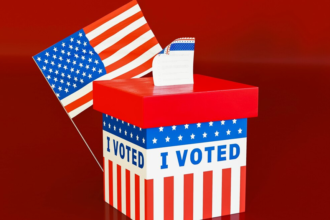Following consecutive debates in English and French, the Liberal Party of Canada’s race to replace Prime Minister Justin Trudeau as leader has entered a pivotal stage. As contenders offer their ideas for the future of the nation, the Liberal Leadership contest has attracted notable interest.
Four candidates—former governor of the banks of Canada and England Mark Carney, former finance minister Chrystia Freeland, House government leader Karina Gould, and businessman and former MP Frank Baylis—now must be chosen among card-holding Liberals.
Whoever wins the vote on March 9 will not only become Canada’s next prime minister but also the future leader of the Liberal Party guiding the party into the upcoming general election, which has to take place either on or before October 20 of this year.
How ought Canada to react to threats made by Donald Trump?
How Canada should react to what many are labeling as a “existential threat” from US President Donald Trump dominated both debates.
Trump has declared intentions to levy a 25% tariff on all Canadian exports, with energy exports subject to a lesser 10% tax—a move economists say may be disastrous for Canada while also driving American consumer prices higher.
More shockingly even, Trump has urged several times that Canada should become the “51st state” of the United States, a suggestion that has drawn strong criticism all over Canada. This strikes many Canadians as an attack on their national identity and sovereignty.
Using her background as a former top minister during Trump’s first term, Freeland said she had effectively opposed his tariffs prior and could do so once more. “We have faced these challenges before, and I know how to negotiate these tough issues to safeguard Canadian interests,” she said.
Carney cautioned, nevertheless, that “the Trump of today is not the Trump of the past.” Declaring Trump “more isolationist, more aggressive,” he also said, “In the past, he wanted our markets.” Now, he wants our nation.
Declaring, “We need to put everything on the table to protect our sovereignty,” Gould, the youngest contender in the race, adopted a hard posture. She also urged the federal government to support Canadian companies in lessening their dependency on the US market. Emphasizing possible economic alliances with the European Union and Asian markets, she said, “diversification is key.”
Emphasizing their common ideals and comparable governments, Baylis suggested Canada to strengthen its economic relations with Australia, New Zealand, and the UK. “Strength of our trade with like-minded countries will help us to be less susceptible to US economic pressure,” he said.
How can Canada address issues of the economy?
Another contentious topic was the discussion of Canada’s economic future since many of its citizens still feel annoyed about the high cost of living. Rising inflation, skyrocketing house prices, and stagnate earnings have made financial stability a major issue for voters.
Drawing on his economic experience, Carney promised to balance Canada’s operating budget within three years while preserving important Liberal Leadership initiatives such dental treatment and reasonably priced childcare. “A strong economy requires responsible management,” he said, adding that his background in global banking especially prepares him to lead Canada through uncertain times.
Defending her performance as finance minister, Freeland said, “Canada’s finances remain strong.” She advised that the present wave of patriotism in reaction to Trump’s threats may be directed to help Canadian businesses and generate employment. “We should seize this opportunity to support homegrown businesses and guarantee Canada stays competitive on the global scene,” she said.
Speaking as a businessman, Baylis underlined the need of raising Canadian production. “Our companies have to modernize and be innovative. Should we wish to compete internationally, we must make sure our sectors are innovative and efficient,” he said.
Gould, on the other hand, objected to Carney’s suggestion, contending that three-year budget balancing calls for drastic cuts—which she opposed. “We need to modernize our social safety net and invest in our people and businesses to protect them,” she said. She underlined the need of ongoing expenditure in social projects, education, and healthcare.
In what way do candidates see Conservative Leader Pierre Poilievre?
While the contenders were sparring one another, they presented a united face against Pierre Poilievre, the head of the Conservative Party, who is presently ranking highest in national surveys.
Gould referred to him as “our little version of Trump here at home,” while Freeland charged him with trying to “imitate” the outgoing US president. She spoke of the perils of divisive politics, saying, “We cannot let right-wing populism dictate Canada’s future.”
Carney went farther, suggesting that “Canada cannot afford to have Poilievre as prime minister” and characterizing him as “irresponsible.”
Poilievre has changed his message from criticizing Trudeau’s leadership to supporting a “Canada First” agenda, stressing the need of defending Canada against US demands with Trudeau’s absence. He has also sharpened his attacks on Carney, his principal opponent in the contest.
Recent surveys indicate that, following Trudeau’s resignation, the difference between Poilievre and the Liberal Leadership hopefuls has closed, notwithstanding his advantage.
How Should Canada Approach Military Spending and the Russia-Ukraine War?
Though they disagreed on the details of how and when to accomplish that aim, all four contenders reiterated Canada’s dedication to helping Ukraine and fulfilling its 2% NATO military budget target.
Arguing that spending should center on “the next generation of warfare,” Freeland pushed for reaching the 2% target by 2027. “We have to make investments in artificial intelligence, cybersecurity, and other contemporary defense technologies,” she said.
Meanwhile, noting issues with budget restrictions and economic stability, Baylis and Carney suggested aiming for the target by 2030. Carney said, “We have to make sure we are investing sensibly.”
Both Freeland and Carney underlined that instead of depending on the US, military expenditures should be directed into Canadian businesses. Freeland also underlined the need of Canada enhancing its security relations with other NATO members including the European Union.
Should Canada trash the carbon tax?
Another divisive topic in the discussions was Trudeau’s government’s contentious carbon price, a main policy.
Carney admitted that the consumer carbon tax had gotten too controversial even though he had long-standing advocacy for climate change. He suggested emphasizing taxing big pollers and growing clean energy projects. “We need rules that fight climate change while yet working for all Canadians,” he said.
Leaving Trudeau’s ministry amid policy differences, Freeland backed his environmental measures but said the carbon tax was unpopular. “Democracy is about listening to people; Canadians were quite clear with us that they did not think that policy worked for them,” she said.
Gould and Baylis, on the other hand, pledged to keep some sort of consumer carbon tax and contended that financial investment is necessary to slow down global warming. Gould said, “We cannot afford to backtrack on climate action.”
Just weeks away, the vote for Liberal Leadership calls for a pivotal choice that will define the Liberal Party’s course in the next election and how it will approach the major obstacles ahead.








